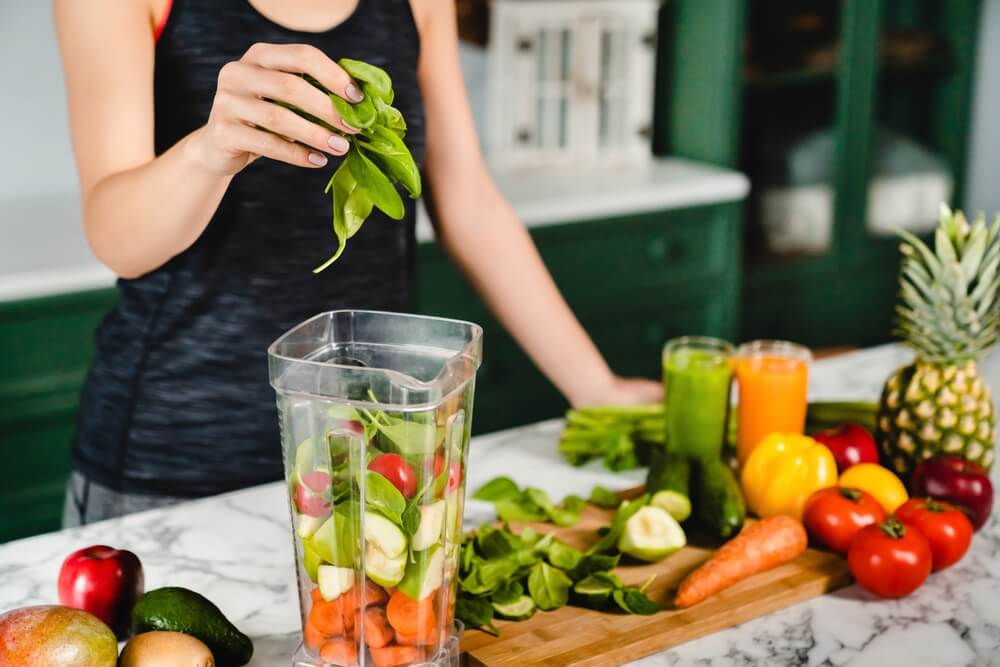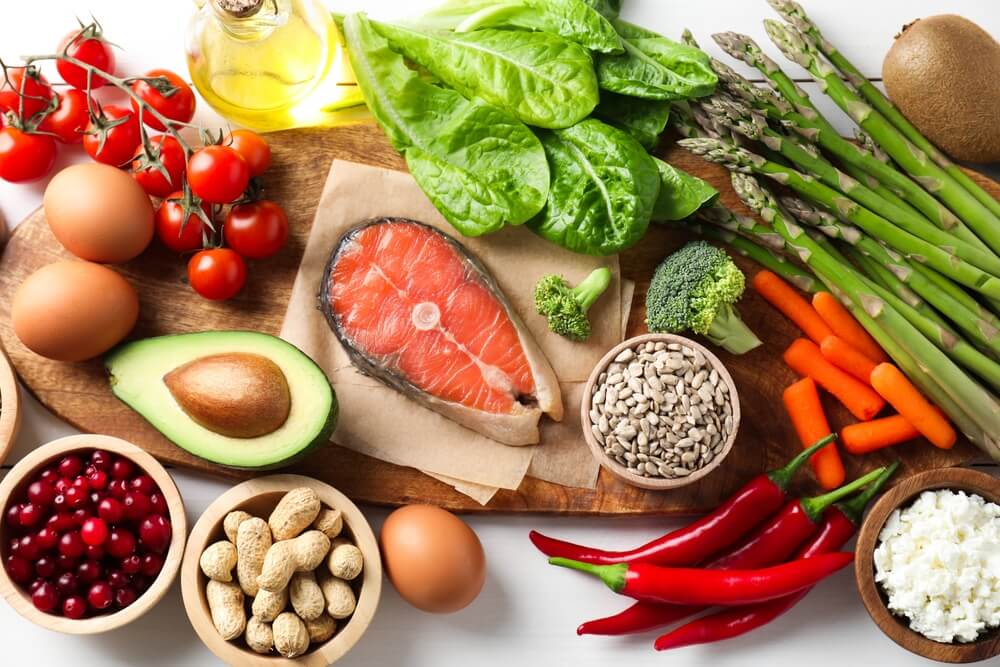Vein-Healthy Diet: Foods That Promote Better Circulation

If you’ve been experiencing cold hands and feet, numbness, or swelling in your legs, you’re not alone. Approximately 10-20 million adults in the United States suffer from peripheral artery disease (PAD), a common cause of poor circulation.
These symptoms can affect your daily comfort, energy levels, and even your long-term vascular health. Many people dismiss these signs as a normal part of aging, but they could be your body’s way of telling you that your blood flow needs a boost.
The good news? Small, everyday changes—especially in your diet—can make a big difference. Certain foods contain key nutrients that help dilate blood vessels, reduce inflammation, and optimize blood flow to keep your veins strong and circulation steady.
In this blog, we’ll explore foods for better circulation and how the right diet can improve blood circulation so you can take control of your health and feel better from the inside out.
What to Eat for Better Vein Circulation
Ever wonder why some people have great circulation, while others struggle with cold feet, swelling, or aching legs? The answer often lies in what’s on their plate.
Your diet is one of the most powerful tools for supporting vascular health so it can function properly. Let’s take a closer look at the essential nutrients that keep your blood circulation in check and the best foods to include in your diet for healthier veins and blood flow.
Nutrients Essential for Vein Health
Your veins work hard every day to transport oxygen-rich blood flow throughout your body. To keep them strong and efficient, they need specific essential nutrients that help reduce inflammation, dilate blood vessels, and prevent issues like poor circulation and blood clot formation.
Here are the key nutrients that support vascular health and promote blood circulation:
- Vitamin C: This powerful antioxidant helps strengthen blood vessel walls and supports collagen production, making veins flexible and less prone to damage. It also aids in dilating blood vessels so blood flow can reach all parts of the body more easily.
- Nitric Oxide Boosting Compounds: These compounds help the body convert nitrates into nitric oxide, a molecule that relaxes blood vessels and improves blood circulation.
- Omega-3 Fatty Acids: These healthy fats help reduce inflammation, lower blood pressure, and prevent blood clot formation.
- Antioxidants: These compounds help reduce oxidative stress, which can damage blood vessels and lead to cardiovascular disease.
- Magnesium: This essential mineral helps relax blood vessels, reduce high blood pressure, and support overall cardiovascular health.
- Flavonoids: Flavonoids have anti-inflammatory properties and help strengthen blood vessels, reducing the risk of varicose veins and improving blood circulation.
- L-Arginine: This amino acid aids in nitric oxide production, which helps dilate blood vessels and improve blood flow and circulation.
Top Foods that Promote Circulation
The right foods can actively improve blood circulation, reduce inflammation, and support vascular health. By including these circulation-boosting foods in your balanced diet, you can help keep your blood vessels strong, flexible, and efficient.
Here are some of the best foods to add to your meals:
- Fatty fish (salmon, mackerel, sardines): Rich in omega-3 fatty acids, fatty fish help reduce inflammation, lower blood pressure, and prevent blood clot formation.
- Citrus fruits (oranges, lemons, grapefruit): Citrus fruits are packed with vitamin C and flavonoids, helping to strengthen blood vessel walls, reduce high blood pressure, and aid in blood flow increases by supporting nitric oxide production.
- Dark leafy greens (spinach, kale, swiss chard): High in nitrates, magnesium, and fiber, these greens help lower blood pressure, relax blood vessels, and keep blood flow steady.
- Nuts and seeds (walnuts, flaxseeds, chia seeds): Nuts and seeds are loaded with healthy fats, L-arginine, and magnesium that help improve blood flow, reduce systolic blood pressure, and promote healthy blood flow.
- Whole grains (oats, brown rice, quinoa): High in fiber, whole grains help reduce blood pressure, support heart disease prevention, and keep blood flow steady.
- Beet juice: One of the best sources of nitrates, beet juice helps the body convert these compounds into nitric oxide.
- Garlic: A natural vasodilator, garlic helps relax blood vessels, reduce blood pressure, and prevent coronary artery disease by improving circulation.
- Pomegranates: Pomegranates are rich in antioxidants and nitric-oxide-boosting compounds, helping increase blood flow and support vascular health.
- Turmeric: This anti-inflammatory powerhouse contains curcumin, which has anti-inflammatory properties that help reduce inflammation and promote overall health.
- Ginger: Known for its numerous health benefits, ginger helps reduce inflammation, improve blood circulation, and support heart health by preventing blood clots.
- Tomatoes: This fruit contains lycopene, an antioxidant that helps dilate blood vessels, reduce oxidative stress, and reduce high blood pressure.

How to Eat for Better Vein Circulation
Eating the right foods is a great start, but how you eat matters just as much as what you eat. A balanced diet rich in circulation-boosting nutrients can only do its job if you’re eating in a way that supports healthy blood flow throughout the day.
To get the most out of your vein-healthy diet, you need to avoid certain habits that negatively impact blood circulation—while also learning how to structure meals in a way that supports vascular health.
Dietary Habits to Avoid for Vein Health
Even if you’re eating foods that improve circulation, certain dietary habits can counteract those benefits. Some foods and eating patterns can weaken blood vessels, increase blood pressure, and contribute to poor circulation.
Avoiding the following pitfalls can help protect your vascular health and keep your blood flow steady:
- Excessive salt intake: Too much sodium causes water retention, leading to swelling, increased blood pressure, and added strain on blood vessels. Processed foods, fast food, and salty snacks are common culprits.
- Too much sugar: A high-sugar diet contributes to inflammation, damages endothelial cells—the thin, protective lining inside your vessels that help control blood flow, dilate blood vessels, and prevent clots—and raises the risk of cardiovascular disease.
- Saturated and trans fats: Found in fried foods, baked goods, and processed snacks, these unhealthy fats promote blood clot formation, raise high blood pressure, and reduce healthy blood flow by clogging blood vessels.
- Low fiber intake: A diet lacking in fiber can lead to poor digestion and increased pressure in the veins, contributing to varicose veins and circulation issues.
- Drinking too little water: Dehydration thickens blood flow and makes it harder for your veins to circulate oxygen and nutrients efficiently.
- Too much alcohol: While moderate alcohol consumption may have some heart health benefits, excessive drinking dehydrates the body, weakens blood vessel walls, and increases blood pressure.
- Skipping meals: Irregular eating patterns can cause blood sugar spikes and crashes, which may damage blood vessels and reduce circulation efficiency.
- Overeating processed foods: Highly processed foods often contain high levels of sodium, sugar, and unhealthy fats, all of which contribute to vascular health problems, including increased systolic blood pressure and reduced blood circulation.
Meal Planning for Optimal Vascular Function
A well-structured meal plan can make all the difference in maintaining healthy blood flow and supporting vascular health. Instead of eating whatever is convenient, focus on eating a balanced diet that includes meals throughout the day full of various circulation-boosting foods. Ideally, you want to target a low-fat, whole foods, plant-based diet. Aim for meals rich in healthy fats, fiber, essential nutrients, and anti-inflammatory properties while avoiding processed, high-sodium, and high-sugar foods that can weaken blood vessels.
To get the most out of your meals, choose healthy recipes that include fatty fish or plant-based omega-3 sources like walnuts and flaxseeds at least twice a week. Pair them with leafy greens and citrus fruits for a dose of vitamin C and nitric oxide-boosting compounds to help relax blood vessels and improve circulation.
Incorporate whole grains like quinoa or brown rice for fiber, and add colorful vegetables rich in flavonoids to fight oxidative stress. Staying hydrated is just as important since drinking plenty of water and incorporating beet juice or herbal teas can further increase blood flow.
Lifestyle Choices that Support Optimal Vein Health
Now that you know how to eat the right foods in the right way, you need the last piece of the puzzle: your daily habits. How you move, hydrate, and care for your body plays a major role in keeping your blood flow steady and your blood vessels strong. Small, intentional lifestyle choices like taking supplements and keeping hydrated can help improve circulation, lower blood pressure, and prevent issues like varicose veins and poor circulation in the long run.
Supplements that Support Vein Health
Even with a balanced diet, it can be challenging to get all the essential nutrients needed for strong, flexible blood vessels and optimal blood circulation. Certain science-backed supplements can help fill nutritional gaps and provide targeted support for vascular health:
- Vitamin C
- L-arginine and L-citrulline (nitric oxide boosters)
- Fish oil supplements (omega-3 fatty acids)
- Diosmin & hesperidin (flavonoids)
- Magnesium
- Horse chestnut extract
- Coenzyme Q10 (CoQ10)
While these supplements can help support vein health, they work best alongside a healthy diet and proper hydration.
Hydration and its Impact on Circulation
Staying hydrated is one of the simplest yet most effective ways to support healthy blood flow and vascular health. Water helps keep blood circulation smooth by preventing dehydration, which can thicken blood flow and make it harder for your veins to transport oxygen and nutrients throughout your body.
Proper hydration also plays a key role in preventing blood clot formation and reducing the risk of poor circulation symptoms like swelling and fatigue. Caffeinated and sugary beverages can dehydrate the body and negatively impact vascular health, so limiting them is key.
To maintain optimal blood circulation, aim to drink at least eight 8-ounce glasses of water per day, or more if you live in a hot climate. Beet juice is also an excellent choice since it boosts nitric oxide levels, helping to dilate blood vessels and improve circulation. Herbal teas, coconut water, and water-rich fruits like watermelon and cucumbers can also contribute to proper hydration.
By staying hydrated with the right fluids in the right amounts, you can keep your veins functioning efficiently and support overall cardiovascular health.
Enjoy Better Circulation and Better Health with Nelson Vein
Your veins play a critical role in your overall well-being, and taking care of them starts with simple, everyday choices. By fueling your body with circulation-boosting foods, staying hydrated, and making smart lifestyle adjustments, you can improve blood flow, strengthen your blood vessels, and reduce your risk of poor circulation and varicose veins. Small changes can make a big difference!
But even with the best habits, some vein conditions require medical expertise. That’s where Nelson Vein & Surgical Services comes in. We provide minimally invasive, advanced vein treatments designed to improve your circulation and get you back to feeling your best.
Our expert team believes in education, family involvement, and compassionate care. We’re here to make sure you fully understand your treatment options and feel supported every step of the way.
No one can take better care of your veins than we can. If you’re experiencing symptoms of poor circulation or want expert guidance on maintaining vascular health, contact us to schedule a consultation today. Let’s work together to keep your veins strong, your blood flow steady, and your health thriving.
